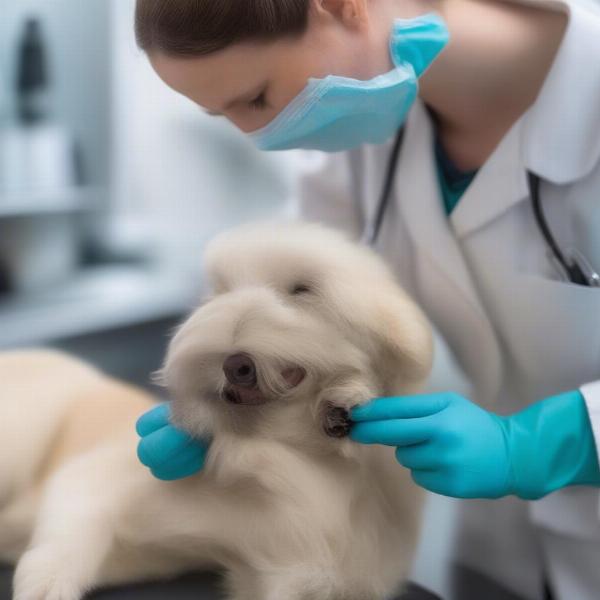Dog antifungal ointments are crucial for treating fungal skin infections, a common issue for our canine companions. These infections can cause discomfort, itching, and hair loss, impacting your dog’s overall well-being. This guide will delve into the world of dog antifungal ointments, covering everything from identifying fungal infections to choosing the right treatment and ensuring effective application.
Understanding Fungal Infections in Dogs
Fungal infections, also known as dermatophytosis or ringworm, are caused by microscopic fungi that thrive in warm, humid environments. They can manifest in various ways, including circular patches of hair loss, redness, scaling, and crusting. Identifying these symptoms early is vital for prompt treatment and preventing the spread of infection. While ringworm is a common term, it’s not actually caused by a worm but by a fungus.
Choosing the Right Antifungal Ointment
Several antifungal ointments are available for dogs, each with its active ingredients and application methods. Common active ingredients include miconazole, clotrimazole, and ketoconazole. itching dog medication Your veterinarian can help you determine the most appropriate ointment based on the type and severity of the infection. Factors like your dog’s age, breed, and overall health will also be considered. Never use human antifungal ointments on your dog without consulting your veterinarian, as some can be toxic to animals.
Applying Dog Antifungal Ointment Effectively
Proper application is key to successful treatment. Before applying the ointment, clean the affected area with a mild antiseptic solution recommended by your vet. Then, apply a thin layer of the ointment, ensuring it covers the entire infected area and a small margin of surrounding healthy skin. rash from dog collar Follow your veterinarian’s instructions regarding the frequency and duration of application. Wearing gloves during application can prevent the spread of infection to humans.
Preventing the Spread of Fungal Infections
Fungal infections can be contagious to other pets and even humans. To prevent the spread, isolate your infected dog from other animals and wash any bedding, toys, or grooming tools that may have come into contact with the fungus. Regularly cleaning and disinfecting your home can also help minimize the risk of re-infection. muricin for dogs Boosting your dog’s immune system through a healthy diet and regular exercise can also contribute to their overall health and resilience against infections.
When to See a Vet
While some mild fungal infections may resolve with topical treatment, it’s essential to consult your veterinarian if the infection is severe, doesn’t improve within a few weeks, or if your dog develops other symptoms like fever or lethargy. dog ear infection treatment nz Your vet can perform diagnostic tests to confirm the diagnosis and recommend the most effective treatment plan. Early intervention is crucial to prevent the infection from spreading and causing further complications.
 Veterinarian examining dog's skin
Veterinarian examining dog's skin
Conclusion
Dog antifungal ointments are effective tools in managing and treating fungal skin infections. By understanding the causes, symptoms, and treatment options, you can help your furry friend recover quickly and comfortably. Always consult with your veterinarian for accurate diagnosis and personalized treatment recommendations. Remember, early detection and proper care are crucial for a successful outcome in treating dog fungal infections with antifungal ointments.
FAQ
- How long does it take for a dog fungal infection to clear up with ointment? Treatment typically takes several weeks, sometimes even months, depending on the severity of the infection.
- Can I use human antifungal cream on my dog? No, it’s crucial to use only veterinarian-prescribed antifungal ointments formulated for dogs. Human medications can be toxic to pets.
- Are fungal infections contagious to humans? Yes, some fungal infections, like ringworm, can be transmitted from dogs to humans. Practice good hygiene and isolate your infected dog to prevent the spread.
- What can I do to prevent fungal infections in my dog? Maintaining a clean environment, providing a healthy diet, and regular grooming can help prevent fungal infections.
- What are the signs of a severe fungal infection in dogs? Severe infections can involve widespread skin lesions, intense itching, secondary bacterial infections, and systemic symptoms like fever and lethargy.
- Can antifungal ointments be used alongside other medications? Yes, your veterinarian may prescribe additional medications, like oral antifungals, depending on the severity of the infection.
- What should I do if the ointment isn’t working? Consult your veterinarian if the infection doesn’t improve within a few weeks of starting treatment. They may need to adjust the medication or explore other treatment options.
Find out more about dog health on ILM Dog!
ILM Dog is a leading international online resource for dog care and well-being, dedicated to providing expert advice and valuable information to dog owners worldwide. We offer comprehensive guides on everything from breed selection and health care to training, nutrition, and product recommendations. Our mission is to empower dog owners with the knowledge and resources they need to provide the best possible care for their beloved companions. For any inquiries or expert advice, please contact us at [email protected] or call us at +44 20-3965-8624. Visit ILM Dog today for all your dog care needs.